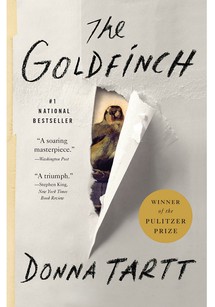Because Tartt had us at The Secret History—and never let us go.
Can a
single moment cast a shadow over every year that follows? In Donna Tartt's
latest novel,
The
Goldfinch—a
brilliant successor to her 1992 international best-seller,
The Secret History—it takes just a split second for
13-year-old Theo's life to be upended. As he and his mother explore the
Metropolitan Museum of Art, waiting for a spring rain shower to abate, a bomb
explodes, and suddenly all is ash, smoke, silence. His mother is killed, but
Theo stumbles to safety, carrying a priceless 17th-century painting,
The Goldfinch, which, in his grief, he clings to
like a lifeline. Exiled to Las Vegas to live with his pill-popping gambler
father, Theo befriends the violence-addled Boris. The two embark on a frenzy of
drinking and drugging, until Theo's abrupt return to Manhattan.
Through
his tainted adolescence runs the innocence of his love for Pippa—herself severely injured in the
blast—and
the kindness of an antiques dealer who provides Theo a home in New York.
Adulthood opens on a sketchy world where stolen masterpieces are collateral for
drug cartels, and Theo becomes adept at friendships and affairs as fake as the
antiques he traffics in. His obsession with keeping
The Goldfinch hidden causes dark clouds of
paranoia to gather over his head.
For
Theo, there are more shadows than light, but now and then "the sun strikes
raindrops at a certain angle and throws a prism of color across the sky."


